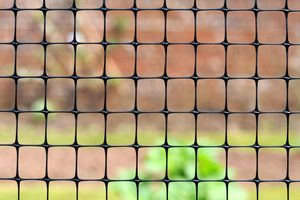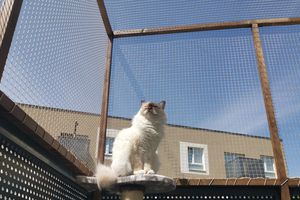How to Stop Cats Killing Birds in Your Garden
“How to stop cats killing birds in my garden?” is a question posed by many wildlife enthusiasts who have spent time and money attracting birds to their gardens.
Well, wonder no more. Whether you’re struggling to keep your own hunter away from the bird table or your neighbours’ cats keep venturing into your garden, we’ve got you covered with a range of humane cat deterrent options.
If you’re short on time, our top recommendations for deterring cats from your garden are:
|
Other People’s Cats:
Your Cat:
|
How to Stop Other People's Cats Killing Birds in Your Garden
Preventing other people's cats and stray cats from harming birds in your garden is much harder than if it were your own cat because there's nothing you can do to affect the cat's behaviour that would be possible if you owned the cat.
However, feral and outdoor cats pose a significant threat to local bird populations, responsible for approximately 27 million bird deaths each spring and summer, so it’s important to take steps to deter them from your garden.
These are our top tips to keep your feathered visitors safe from unwanted feline attention.
1. Raise Your Bird Table Height
Bird tables are a great way to attract birds to your garden, but they also create the ideal target for hunting cats and other animals. You don't have to get rid of your bird table entirely, but by raising it a few extra feet from the ground, the feeding platform may be out of reach for many cats.
Of course, you should also make sure your bird feeder isn't too close to a fence or wall, as raising the height could just make it easier for your neighbour's cat to jump down and swipe a bird.
2. Use an Ultrasonic Cat Deterrent
Ultrasonic cat deterrents are a great option for keeping cats out of your garden without causing any harm.
These devices emit a high-frequency sound that is unpleasant for cats but inaudible to humans. They can be easily installed near your bird table or around your garden perimeter to keep unwanted feline visitors away.
However, keep in mind that these deterrents may also impact other animals and insects in the area, so use them sparingly and carefully.
Note: Ultrasonic cat deterrents and ultrasonic bird deterrents are different and emit different frequencies when in use. So, your cat deterrent won't also deter birds from your garden.
3. Use Olfactory Cat Deterrents
You can also invest in some cat deterrents that emit a smell that wards off cats. The most common type is lion's poo deterrent which uses a scent that mimics the smell of big cats, deterring smaller felines from entering your garden.
Another option is citrus-based deterrents, as cats are known to dislike the smell of citrus fruits. These can come in the form of sprays or granules that you can scatter around your garden.
You can also make your own DIY citrus repellents from the peel left over from your fruit bowl or essential oils.
4. Install High Fences
If you'd prefer to keep other people's cats out of your garden altogether, installing high fences is a foolproof method.
Cats are known to be excellent climbers, so to keep them out, you need to ensure that your fences are at least 6 feet tall and have no footholds or gaps that cats can use to enter.
Note: We wouldn't recommend adding bird spikes or similar to the top of your fence to deter cats, as they can cause injury or cause the cats to get stuck. Always make sure you're adhering to the Animal Welfare Act, 2006.
5. Plant Cat-Repellent Plants
Some plants naturally repel cats with their strong scents. These include lavender, rue, and pennyroyal. Planting these around the perimeter of your garden can help deter cats from entering.
However, be cautious when planting these, as some of them can be toxic to pets if ingested.
We recommend doing plenty of research to make sure your plants are safe for your plants or for cats that venture into your garden, regardless. The Cat's Protection and Blue Cross have plenty of information about plants to avoid.
6. Block Gaps With Netting
If you already have a high fence around your garden but cats still manage to get in, check your fence for gaps and holes where they might be able to squeeze through.
Using garden netting is a great way to prevent cats from getting in while still letting smaller garden-friendly wildlife in.
We stock a wide range of garden netting at Huck Nets that are ideal for blocking holes and gaps in your fencing, from small mesh sizes to keep everything out to larger netting that allows small rodents and bugs through.
Note: Cats are notoriously able to squeeze through tiny spaces, so make sure even the smallest of gaps is covered.
7. Install a Sprinkler System
Of course, if you want to keep your garden looking lush while deterring cats from your garden, a motion-activated sprinkler system is the ideal solution.
These systems make your garden uninviting for cats. Just be mindful that they can also deter birds from landing in your garden, so make sure you have plenty of high places for your avian visitors to land to avoid getting wet.
How to Stop Your Cat Killing Birds in Your Garden
It's not just other people's cats that can be a threat to the avian wildlife in your garden. If you own a cat, you'll know all too well the damage they can do to unsuspecting feathered visitors.
Here are some tips to help you keep birds safe from your cat in your own garden and your neighbour's gardens.
1. Install Cat Netting Over Your Windows
Installing cat netting over your windows is an effective way to prevent your cat from killing birds in your garden.
This physical barrier creates a boundary that stops your cat from accessing birds that may be within reach outside. By enclosing your windows with cat netting, you provide a safe space for birds to perch or fly without the risk of being hunted by your feline friend.
This solution not only protects the birds but also ensures your cat's safety by limiting their exposure to potential harm or accidents outdoors.
Our coated plastic Cat Netting is made from UV-stabilised, rot-proof, and weather-proof materials. It provides long-lasting protection that will not fade or become brittle with sun exposure. This netting can be cut to any length to fit your windows.
2. Create An Outdoor Cat Enclosure
Creating an outdoor cat enclosure, commonly known as a catio, is an effective way to protect garden birds from your cat.
By building a catio, you provide your feline friend with a controlled outdoor environment where they can experience the sights and sounds of the outdoors without posing a threat to the local bird population.
Catios come in various sizes and designs, allowing your cat to enjoy the fresh air and sunshine safely. It's a win-win situation as it safeguards both your cat and the birds that visit your garden.
Plus, with the right catio setup, you can enhance your cat's overall well-being by giving them a stimulating outdoor experience while maintaining a harmonious ecosystem in your garden.
If you’re going to build your own Catio, remember that our cat netting is durable and designed to create a safe space for your feline friend.
3. Put a Bell on Their Collar
Putting a bell on your cat's collar is the most simple yet effective way to keep garden birds safe from your cat. No matter how good they are at sneaking up on their prey, a little collar bell will instantly give away their movements, allowing birds to get away.
Note: Make sure you regularly check your cat's collar, as they can easily be lost and will need replacing to keep the birds in your garden safe.
4. Change to a High-Meat-Content Food
Some cats hunt birds for fun, playing with the bird rather than eating it. Others hunt birds to meet their nutritional needs and eat the birds.
If your cat tends to eat the birds they catch, changing their diet to include high-meat-content food is a simple way to deter them.
5. Make Sure They're Spayed or Neutered
Making sure your cat is spayed or neutered is not only the responsible thing to do (especially for an outdoor cat) but it can also reduce the likelihood of them hunting birds.
Spaying or neutering cats reduces their instinct to hunt and can make them less aggressive towards other animals.
What's the Law Surrounding Deterring Cats?
In the UK, the law regarding deterring cats from gardens is somewhat nuanced. Generally, it's lawful to take non-harmful measures to keep cats out of your garden, such as those mentioned above.
However, it's crucial that any action taken does not harm the cat, as under the Animal Welfare Act 2006, causing unnecessary suffering to any domestic or captured animal is illegal.
Hence, the use of harmful substances or sharp objects that could injure a cat is strictly prohibited. It's best to use humane deterrents and ensure that any measures you take are safe and don't cause harm to the cats.
Summary: How to Protect Birds From Cats in Your Garden
Creating a wildlife-friendly garden that's safe for birds and unwelcoming to hunting cats involves a blend of strategies. The key is to make your garden an unattractive or inaccessible area for cats without causing them harm, thereby protecting both feline visitors and feathered friends.
For more insightful tips on creating a harmonious outdoor space that respects and protects all forms of wildlife, visit our blog.
FAQs
What is the Best Way to Stop Cats from Killing Birds?
The most effective way to prevent cats from killing birds in gardens is to make it difficult for your cat to sneak up on the birds or for any cat to reach the birds in your garden by keeping bird feeders out of reach or making your garden unwelcoming to cats.
What Repels Cats From Gardens?
Natural repellents like citrus peels, coffee grounds, and lavender plants can effectively deter cats from gardens due to their strong scents. Motion-activated devices and physical barriers such as fences or prickly plants also help keep cats at bay, ensuring garden safety while protecting wildlife.
What is the Most Effective Cat Deterrent?
The most effective cat deterrent is a combination of methods that make it challenging for cats to access your garden or prey on birds. Natural repellents, along with barriers like fences and motion-activated devices, can create an environment that discourages cats from entering your space.
What Scents Do Cats Hate?
Cats have a strong aversion to certain scents, with citrus, lavender, peppermint, and eucalyptus being among the odours cats dislike. These scents are effective in repelling cats from areas like gardens due to their overpowering nature, helping to keep them away from sensitive areas.


